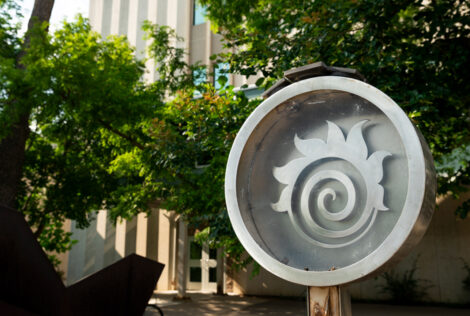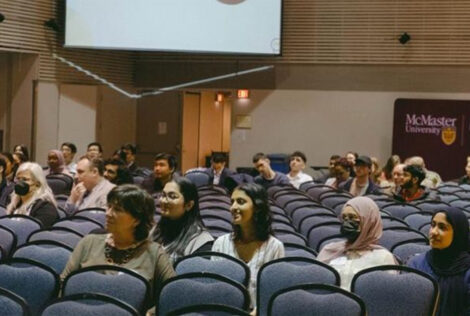
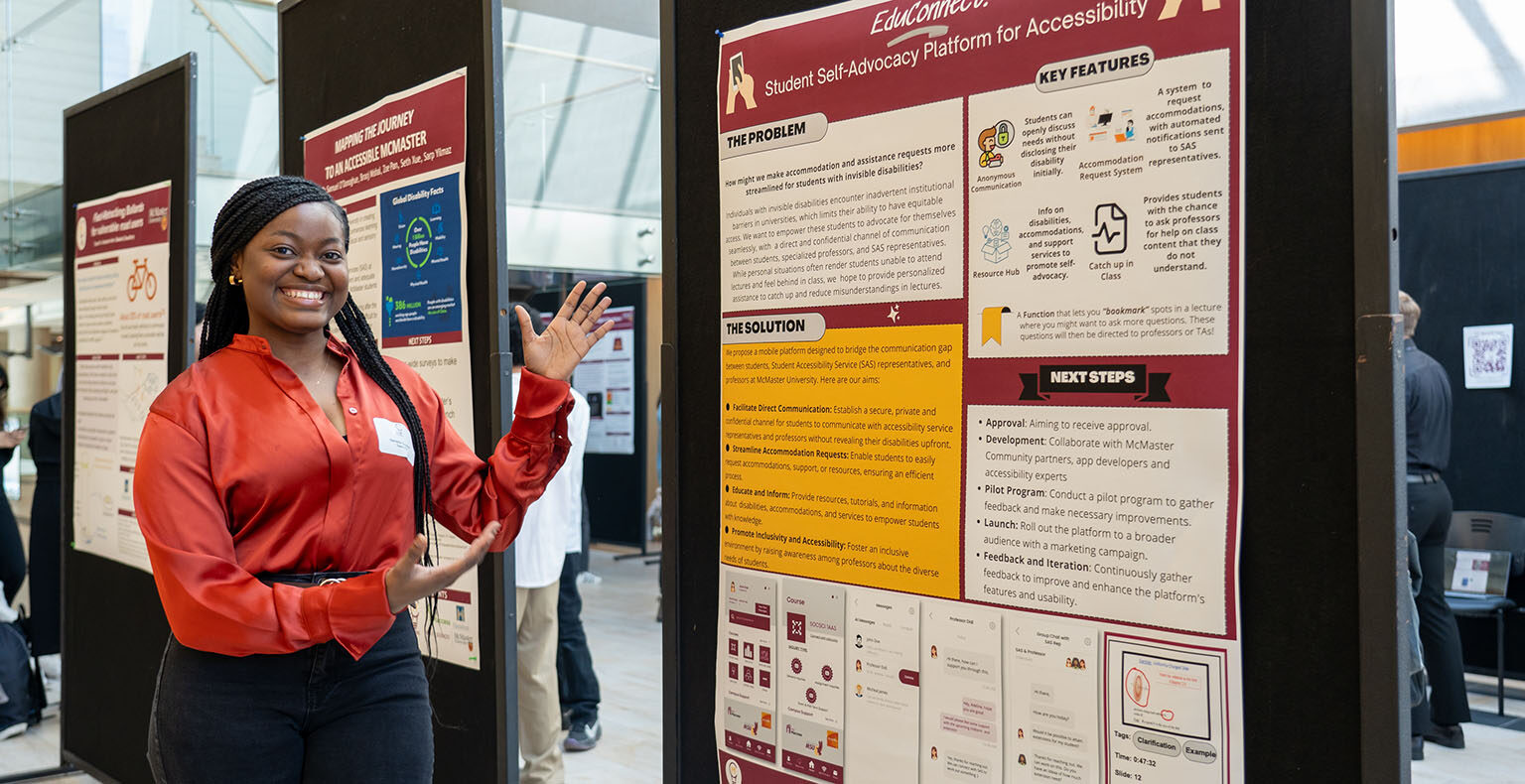
The MacChangers program inspires McMaster University students to spark change through the creation of meaningful solutions in four challenge areas: built environment and infrastructure, communities, arts and culture, clean and green, and healthy and safe cities. These areas align with priorities in Our Future Hamilton – Community Vision – a future-focused plan intended to galvanize community members and partner organizations to make improvements to the city.
Initially a McMaster Engineering initiative, MacChangers has expanded to include students across the university in all years of study, adding cross-disciplinarity to the program, benefiting the quality of the projects and the overall student experience.
Students develop their professional and transferable skills through MacChangers, Human-centred design, the financial viability of their solutions, prototyping, communication, teamwork, leadership and problem-solving are nurtured through this experiential learning opportunity that has real-world impact.
A project developed in part by MacChangers was recently greenlit by Hamilton Bike Share and featured on the CBC.
An annual showcase on April 2 featured MacChangers projects for the 2023-24 cohort, bringing together more than 100 audience members interested in the proposed solutions.
Below are 10 of the featured projects that showcase the depth and breadth of the students’ work.
Challenge area: Built environment and infrastructure
- A desk lamp to improve lighting-related sensory challenges in Thode Library
A mobile app that pairs with a desk lamp in single-study cubicle spaces in Thode Library will allow individuals studying in the space to change brightness and tone remotely and save personalized adjustments. The solution aims to create an accessible learning environment for students and addresses inconsistent lighting across campus and the negative impacts of overly bright or dim lighting on a person’s stress level and ability to focus.
Students involved: Aaron Yim, Rita Gergis, Angela Kwon, Hermione Do
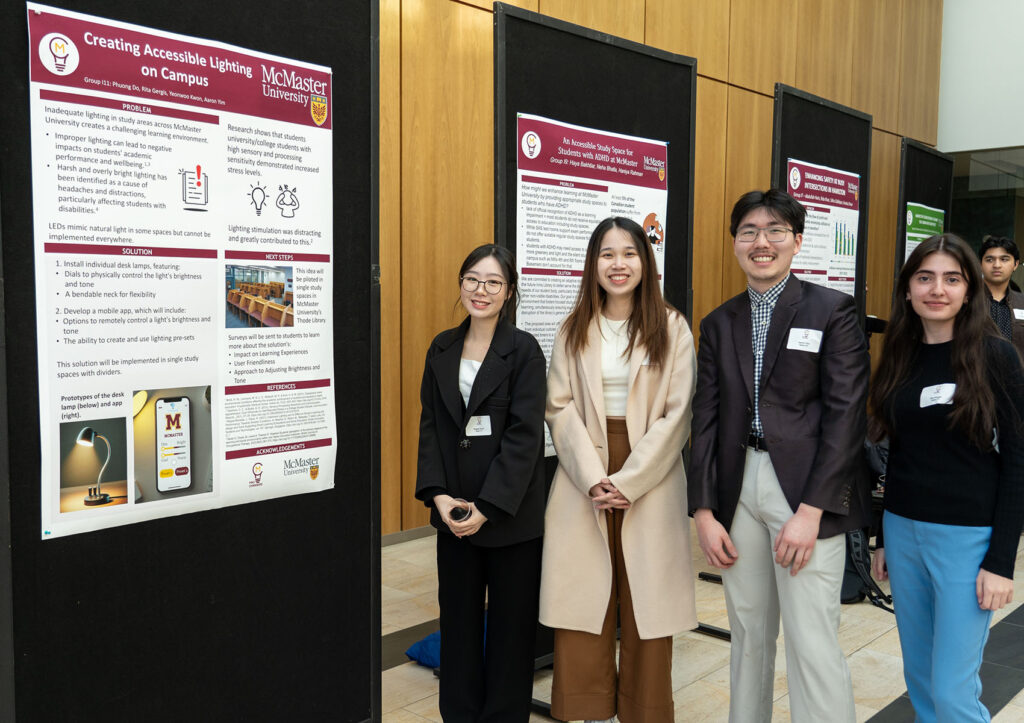
- An app to enhance the educational journey of McMaster students with ADHD
The McMaster’s Learning Portal app is designed to support students with attention deficit hyperactivity disorder (ADHD). The app facilitates connections through class-specific discussion boards, channels for organized content navigation and a feature for peer collaboration. It incorporates McMaster Tutor Services to provide tailored academic support with a dedicated resource page offering ADHD-specific tips and tools.
Students involved: Tracy Su, Analpa Vishwanath, Sadra Esmaeil-Tehrani, Nidhi Malhotra, Eversen Shen
- Redesigning ground-level parking lots to minimize urban heat island effect
By integrating several pre-existing solutions into a cohesive design, the students’ redesign of parking lots aim to minimize the absorption and retention of heat on paved surfaces. They propose replacing most parking spots with a permeable polymer lattice, replacing asphalt roads with concrete grids, adding water run-off channels below the surface to irrigate the vegetation and improve tree cover and planting hedgerows for shade.
Students involved: Taskin Eera, Bohdan Mozharivsky, Liliana Patru, Dylan Thomas
- Improving intersection design to increase safety for vulnerable road users
Installing in-ground pavement LED lights for pedestrians at intersections will help people with auditory and mobility difficulties by providing clear visual cues that capture attention. They will also serve to remind higher-risk pedestrians like smartphone users, children and tourists to stay alert when crossing.
Students involved: Laura Jurgeleviciute, Disha Patel, Rebecca Adiyiah, Brian Kim
Challenge area: Communities, arts and culture
- Campus Community Fridge app to address food insecurity at McMaster
Students can use the app to receive real-time visibility into available items in the community fridge before traveling to it. The app fosters a supportive network by enabling recipe-sharing based on various dietary needs and restrictions. Using AI, the app updates inventory when food is donated or removed, ensuring accuracy, with support from volunteers making manual updates as well.
Students involved: Fatim Kalogo, Chinwendum Onyeocha, Kamsi Okpalugo, Jola Adeoye
- Improving engagement between first-year students and the downtown Hamilton community
The Community Connectors project introduces a digital platform designed to enhance first-year McMaster University students’ engagement with the Hamilton community by providing tailored access to volunteer opportunities, cultural events, educational programs and more. By matching student interests with relevant activities, the platform strives to increase active involvement and civic participation.
This is the first project to be awarded the Stewart-Levinson Trophy for an outstanding performance in the MacChangers program.
Students involved: Amber Siddiqui, Kiya Palta, Sophie Layton, Ope Oluwasola, Andy Tang
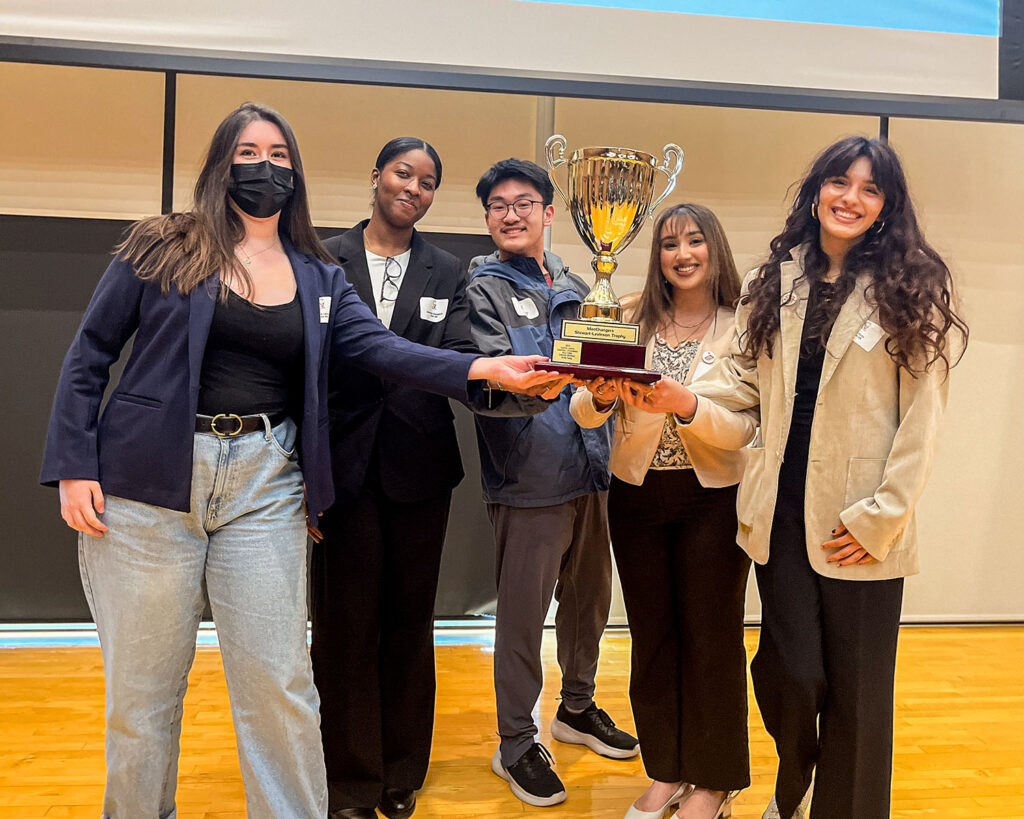
Challenge area: Clean and green
- Helping seedlings planted on McMaster property survive
To help the outcome of seedlings on McMaster property, the students propose the use of a rope-and-bell fencing system to temporarily protect saplings that are often destroyed due to white-tail deer. The rope will act as a physical barrier and the bell works as a noisemaker for an audio deterrence.
Students involved: Delux Jemeamlouis, Dhiren Patel, Harrison Johns, Anne Yang, Leelah Wong
- Reducing the amount of cigarette and vape waste generated by young adults
A recycling program will help reduce waste of used cigarettes and vapes through the use of designated waste receptables placed at highly accessible, main entrances to campus. Waste collected could be sent to TerraCycle, which focuses on recycling complex waste, via their free recycling programs.
Students involved: Austin Daniels, Olivia Redford
Challenge area: Healthy and safe cities
- Designing safe consumption sites in Hamilton
Alongside members of the community, the project team proposes a co-designed approach to create more accessible and safe consumption sites or spaces for women and gender-diverse individuals through the implementation of mobile support units. Staff of the units will have appropriate expertise and training to promote inclusivity and reducing stigma around safe consumption sites.
Students involved: Zainib Nazir, Charlotee Boorman, Parineeta Vaid, Xiaodong Zhang
- A mobile app to assist individuals living with dementia
Dementia PocketCare will strive to assist the more than 12,000 in Hamilton living with dementia access government-run services. By improving access to healthcare, financial and government services in the city through the app, people living with dementia will have improved autonomy through a minimalistic mobile application.
Students involved: Zeid Hazeen, Molly Gomes, Kavya Surendran, Bassam Almoli, Sanjanaa Arunagiri

